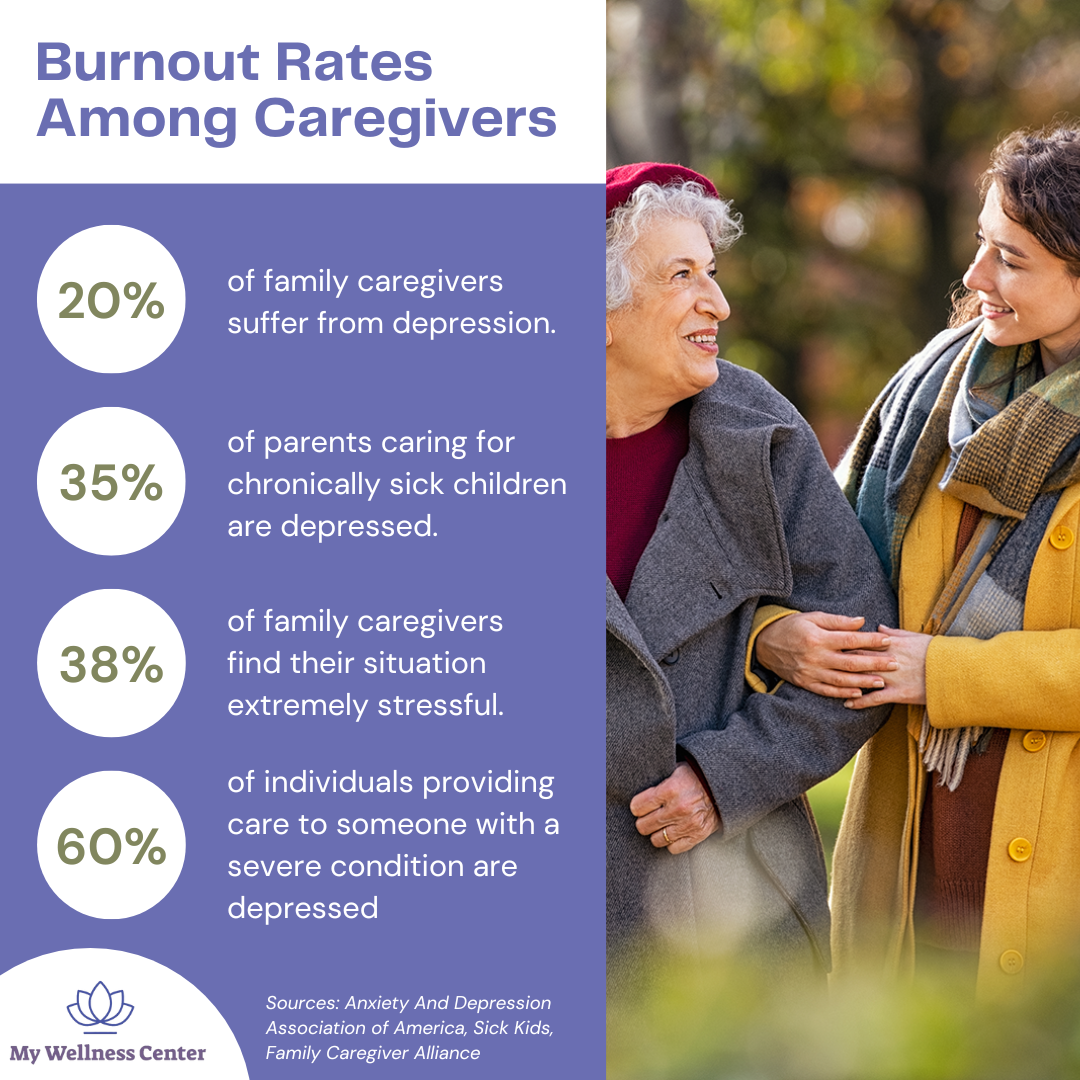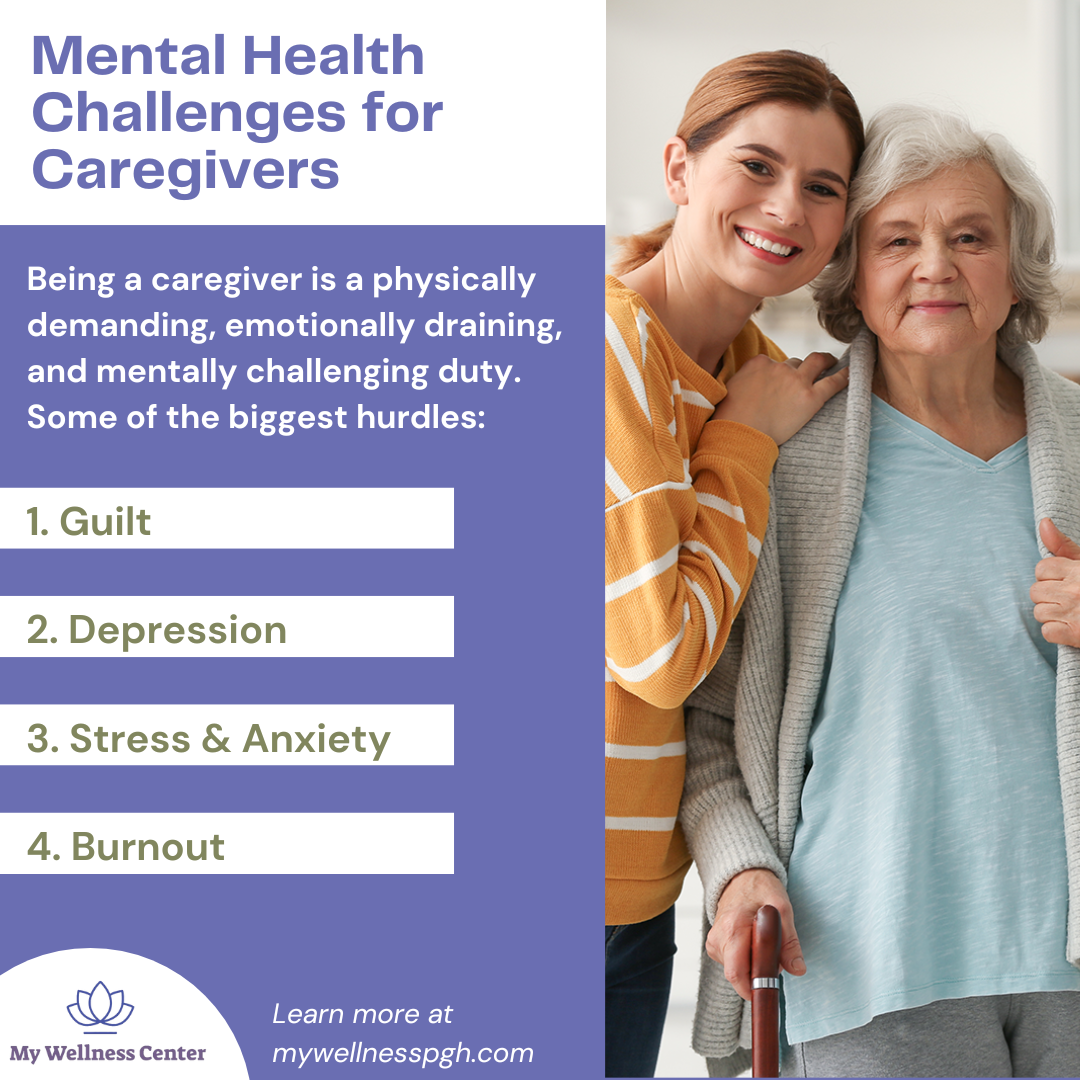At some point in your life, there’s a pretty good chance you’ll be called upon to be a caretaker for a loved one. Research shows 16% of Americans provide care to an adult with a disability or illness, and these caregivers often experience high levels of stress, depression, and anxiety. That’s why therapy for caregivers is so important.
Additional research has shown:
- 20% of family caregivers suffer from depression (Source: Anxiety And Depression Association of America)
- 35% of parents caring for chronically sick children meet the criteria for depression (Source: Sick Kids)
- 38% of family caregivers find their situation extremely stressful (Source: Anxiety And Depression Association of America)
- 60% of individuals providing care to someone with a severe condition show clinical signs of depression (Source: Family Caregiver Alliance)

Our country has a mental health crisis among caregivers, and getting them the proper support is essential for their own wellbeing—and the wellbeing of the people they care for.
Mental Health Challenges for Caregivers
Being a caregiver isn’t a glamorous job. It’s a physically demanding, emotionally draining, and mentally challenging duty.
And caregivers face a variety of mental health challenges, including:

1. Guilt
Caregivers may manage guilt from a variety of different sources. Some of the most common reasons for guilt among our caregiving patients include:
- The guilt of ignoring other responsibilities. The rest of the world doesn’t stop just because someone paused their own to care for a loved one. As an individual cares for a parent or loved one, they still have other responsibilities, many of which become neglected.
- The guilt of ignoring other family members. When someone becomes a caregiver, they may neglect other people they love, including their spouse, their kids, and their friends.
- The guilt of not being there or taking a break. When a caregiver does finally step away from their responsibilities temporarily, they’re often racked with the guilt of not being there to provide comfort and medical attention.
On the worst days, being a caregiver can feel like a lose-lose situation.
2. Depression
As we examined earlier, caregivers experience much higher rates of depression than the average adult in the US. For reference, only 8% of American adults are depressed, while 20-60% of caregivers are depressed.
3. Stress & Anxiety
Caregivers experience stress and anxiety from a variety of sources, including:
- Concern About Their Loved One – Being a caregiver means being the primary source of love, care, and affection for the sick individual—and that’s a big task and a huge mental burden.
- Pressure to Return to Work – Although US citizens are entitled to time away from work through the Family Medical & Leave Act (FMLA), most employees aren’t paid for those hours away. Worse, some employers are guilty of pressuring or threatening employees to return before they’re ready.
- Financial Strain – That time away from work—and the cost of medications and other essential medical care devices—can create a severe financial strain for the caregiver and the rest of the family.
4. Burnout
Just as many caregivers experience higher levels of depression, they’re also more likely to suffer from burnout—a direct result of prolonged physical, emotional, and mental exhaustion.
Not only are caregivers often called upon to face new challenges with underdeveloped or non-existent nursing skills, but they’re also tasked with an individual’s comfort, health, and overall well-being.
This level of responsibility can lead to depression, withdrawal, feelings of hopelessness or helplessness, and physical exhaustion no matter how much time they sleep at night.
Therapy for Caregivers: Techniques
Our Pittsburgh therapists use a variety of techniques to help caregivers work through their biggest stressors, helping them get back to caring for their loved ones with renewed passion.
That may include:
- EMDR – Eye Movement Desensitization and Reprocessing therapy is a powerful treatment for overcoming past traumas, including those that lead to PTSD. In many cases, EMDR is one of the fastest ways to heal from traumas, including the traumas of watching a loved one’s physical and mental health deteriorate.
- Acceptance & Commitment Therapy – In ACT, the patient works to accept and deal with negative thoughts, feelings, symptoms, and circumstances associated with caregiving while committing to healthy, constructive activities.
- Cognitive Behavioral Therapy – CBT is a form of talk therapy that focuses on modifying emotions, behaviors, and thoughts related to caregiving. With CBT, a patient learns to identify their emotions, behaviors, and thoughts as they experience them, then chooses to react in a productive manner.
While these treatment methods are popular, your therapist may ultimately decide to use a different technique to help you move beyond the stressors of caregiving!
Schedule An Appointment With A Caregiver Therapist
If you’re looking for a Pittsburgh therapist specializing in caregivers, contact us! We can connect you with a qualified therapist who specializes in therapy for caregivers, and who can help you manage the trauma and stress of the caregiver’s responsibilities.

